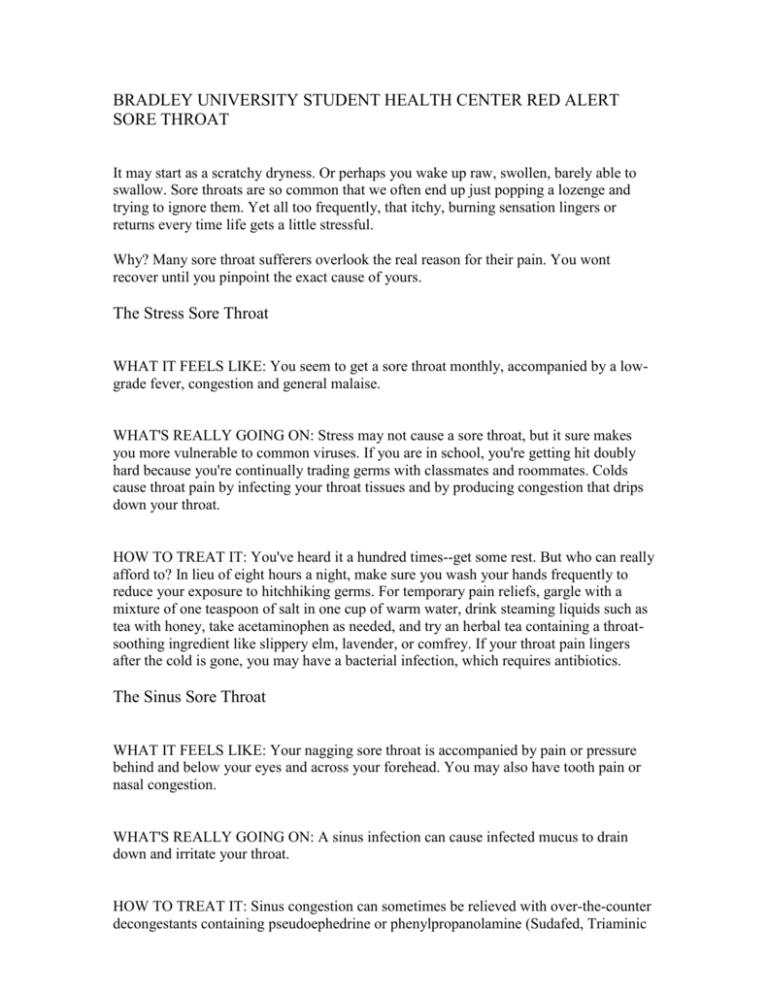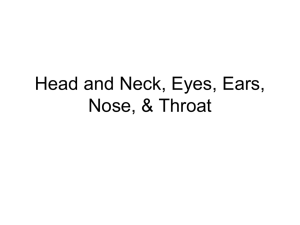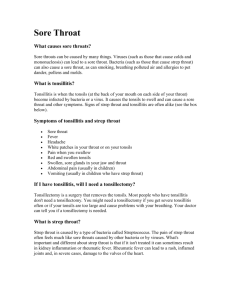Sore Throat - Bradley University
advertisement

BRADLEY UNIVERSITY STUDENT HEALTH CENTER RED ALERT SORE THROAT It may start as a scratchy dryness. Or perhaps you wake up raw, swollen, barely able to swallow. Sore throats are so common that we often end up just popping a lozenge and trying to ignore them. Yet all too frequently, that itchy, burning sensation lingers or returns every time life gets a little stressful. Why? Many sore throat sufferers overlook the real reason for their pain. You wont recover until you pinpoint the exact cause of yours. The Stress Sore Throat WHAT IT FEELS LIKE: You seem to get a sore throat monthly, accompanied by a lowgrade fever, congestion and general malaise. WHAT'S REALLY GOING ON: Stress may not cause a sore throat, but it sure makes you more vulnerable to common viruses. If you are in school, you're getting hit doubly hard because you're continually trading germs with classmates and roommates. Colds cause throat pain by infecting your throat tissues and by producing congestion that drips down your throat. HOW TO TREAT IT: You've heard it a hundred times--get some rest. But who can really afford to? In lieu of eight hours a night, make sure you wash your hands frequently to reduce your exposure to hitchhiking germs. For temporary pain reliefs, gargle with a mixture of one teaspoon of salt in one cup of warm water, drink steaming liquids such as tea with honey, take acetaminophen as needed, and try an herbal tea containing a throatsoothing ingredient like slippery elm, lavender, or comfrey. If your throat pain lingers after the cold is gone, you may have a bacterial infection, which requires antibiotics. The Sinus Sore Throat WHAT IT FEELS LIKE: Your nagging sore throat is accompanied by pain or pressure behind and below your eyes and across your forehead. You may also have tooth pain or nasal congestion. WHAT'S REALLY GOING ON: A sinus infection can cause infected mucus to drain down and irritate your throat. HOW TO TREAT IT: Sinus congestion can sometimes be relieved with over-the-counter decongestants containing pseudoephedrine or phenylpropanolamine (Sudafed, Triaminic Expectorant, to name two). If symptoms are severe or last more than two weeks, see a doctor. Outpatient surgery to open chronically blocked sinus passages can help in extreme cases. The Allergic Sore Throat WHAT IT FEELS LIKE: Your throat is continually raw and scratchy, and you may feel congested and fatigue. There may also be a pattern to your pain--say, every September (hay fever), each time you pet the cat (Animal dander), or when you?re around secondhand smoke. WHAT'S REALLY GOING ON: Your throat pain is caused by postnasal drip triggered by allergies or nasal irritants. HOW TO TREAT IT: When it comes to airborne allergens and irritants, avoidance is the best medicine. Reduce your exposure to dust mites, for example, by encasing your pillows and mattress in allergen proof covers. Prescription nasal sprays containing topical steroids or mast cell inhibitors can help reduce a postnasal drip. The Acid Reflux Sore Throat WHAT IT FEELS LIKE: Burning worsens after a meal and when you lie down. You may also notice heartburn or a sour taste in your mouth. No other cold or flu-like symptoms are present. WHAT’S REALLY GOING ON: Your sore throat stems from stomach acid backing up into your esophagus (acid reflux) HOW TO TREAT IT: If you smoke, quit. If you’re overweight, shed some pounds. Avoid spicy, fatty, or acidic foods (citrus and tomato products), chocolate, and peppermint. Cut down on the size of your meals, avoid eating within three hours of bedtime, and elevate the head of your bed six inches. Unlike heartburn, acid reflux causing throat pain doesn’t generally respond to over the counter antacids. Talk to your doctor about prescription drugs. The Voice Abuse Sore Throat WHAT IT FEELS LIKE: Your throat is continually raw and your voice is hoarse, but you have no fever or malaise. Chances are, you talk a lot--teaching, answering phones, making presentations. WHAT’S REALLY GOING ON: You don’t have to be a singer or public speaker to have President Clinton--style laryngitis. You may simply be over/or misusing your voice, causing undue stress to the vocal chords. HOW TO TREAT IT: Resting your voice is the best way to recover from soreness due to abuse. Follow these tips to reduce daily strain: Drink lots of liquid to stay hydrated: avoid whispering of frequently clearing your throat; speak in a normal tone at low volume and try not to compete with background noise; give emphasis by changing your intonation or using gestures; and see a speech therapist to learn how to use your diaphragm properly. If the problem persists, see an otolaryngologist. The Dry Air Sore Throat WHAT IT FEELS LIKE: Your chronic sore throat seems to crank up along with the furnace each winter. The scratchy dryness may be worse in the morning. THIS IS A CHRONIC PROBLEM WITH BRADLEY DORMS! WHAT’S REALLY GOING ON: If your house is sealed tight and the heater’s blasting, the air may be as dry as the Mohave Desert. You may also not be drinking enough to keep your body hydrated. (Choose noncaffeinated beverages). HOW TO TREAT IT: It may sound a bit crass, but drink till your urine is pale. Clear urine is a good indicator that you’re well hydrated. A humidifier can also help. (A real necessity in Bradley Dorms) If your throat is still dry, ask your doctor about “mucolytic” medications, which help lubricate the throat. The Nasal Obstruction Sore Throat WHAT IT FEELS LIKE: Your only complaint is a chronically dry, raw throat. It may get worse in winter, but it never really goes away. Chances are, you snore and have difficulty breathing through your nose. WHAT’S REALLY GOING ON: The nose is the body’s great humidifier, moistening and warming the air you breathe. By contrast, breathing through your mouth delivers a blast of cold, dry air to your throat. HOW TO TREAT IT: See an otolaryngologist, who can diagnose a physical blockage such as a deviated septum or nasal polyps or even oversized tonsils and adenoids. Treatment options include minor surgery. The Tonsillitis Sore Throat WHAT IT FEELS LIKE: Your throat hurts frequently, and the pain is accompanied by fever and red, swollen tonsils. Antibiotics help temporarily. WHAT’S REALLY GOING ON: Though nature designed tonsils to be a barrier against germs, they can become a reservoir. Repeated infection often leaves tonsils pitted with crypts where bacteria can lurk, out of the reach of antibiotics. HOW TO TREAT IT: If you get five or more bacterial infections a year, consider a tonsillectomy. The Overtreated Sore Throat WHAT IT FEELS LIKE: A course of antibiotics makes you feel better, but the pain returns after your prescription runs out. WHAT’S REALLY GOING ON: Resistance to standard antibiotics has become a common cause of lingering throat infections. This is especially true of infections suffered by students who attend school. HOW TO TREAT IT: A follow-up visit to your doctor is in order. The doctor may culture your throat to pinpoint the stubborn strain of bacteria that’s plaguing you, or simply prescribe a more powerful antibiotic. And always complete the full course of your antibiotic. When a patient stops taking a prescription prematurely, a few strong, lingering bacteria may reinfect with a vengeance. WARNINGS: Don’t gargle with strong alcohol-or phenol-based mouthwashes, which can irritate an inflamed throat. Limit the use of decongestant nasal sprays. Prolonged spraying (more than three days) can produce rebound congestion. Avoid using cough suppressants for more than three or four days. They can cause a buildup of mucous in the lungs, which can lead to a serious infection such as pneumonia. Don’t megadose on Vitamin C. Taking more than 1,000 milligrams a day can aggravate acid reflux.







